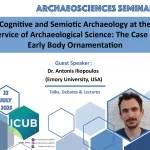The Research Institute of the University of Bucharest (ICUB) invites you to the 47th ArchaeoSciences seminar. This edition’s guest speaker is Dr. Mircea Iliescu from the University of Cambridge, UK, who will present a lecture titled “The Evolution of Human Diversity”.
The seminar will take place on 31 October 2025, starting at 14:00 (EET), at the Administrative Building within the “Dimitrie Brândză” Botanical Garden (Șoseaua Cotroceni 32, Bucharest).
About the presentation
The genomic revolution entered a new phase with the (almost) complete decoding of the first human genome in 2003. Since then, the rapid evolution of sequencing techniques has opened up numerous opportunities for the study of human genetics. The Nobel Prize in Medicine in 2022, for example, was awarded for paleogenomics: the decoding of the Neanderthal genome.
This seminar aims to provide basic concepts of evolutionary genetics, with an emphasis on the field of paleogenomics and the genomic diversity of modern humans. As such, the aim is to better understand the evolution of modern humans in the context of adaptation to new environments across the globe. Genetic adaptations involved in medically relevant traits will also be discussed.
Dr. Mircea Iliescu holds a PhD in Human Genetics and Evolution at the University of Cambridge, UK. Throughout his career, he travelled across multiple continents in order to study the genetic evolution of different populations. He currently leads international research projects which bring together specialists from Romania, India and the United Kingdom to understand the origins and evolution of diversity in groups with complex histories, such as the Roma minority or populations in India. The goal of these studies is to successfully use genetics in personalized medicine.
These seminars are an original initiative of the ArchaeoSciences Platform (ASp) at ICUB, which aims to provide an open space for professionals in archaeological sciences worldwide to share knowledge and engage with the latest methodological and theoretical advances in the study of the past. They also offer Romanian students a valuable opportunity to discover the interdisciplinary dimensions of archaeology and archaeosciences.







